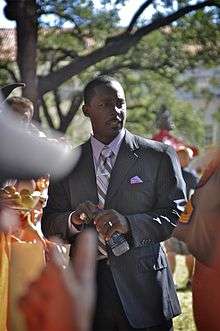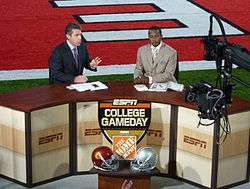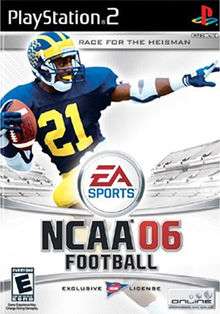Desmond Howard
 Howard in Austin, Texas | |||||||||
| No. 80, 81,18 | |||||||||
|---|---|---|---|---|---|---|---|---|---|
| Position: | Wide receiver / return specialist | ||||||||
| Personal information | |||||||||
| Date of birth: | May 15, 1970 | ||||||||
| Place of birth: | Cleveland, Ohio | ||||||||
| Height: | 5 ft 10 in (1.78 m) | ||||||||
| Weight: | 188 lb (85 kg) | ||||||||
| Career information | |||||||||
| High school: | Cleveland (OH) St. Joseph | ||||||||
| College: | Michigan | ||||||||
| NFL Draft: | 1992 / Round: 1 / Pick: 4 | ||||||||
| Career history | |||||||||
| Career highlights and awards | |||||||||
| |||||||||
| Career NFL statistics | |||||||||
| |||||||||

Desmond Kevin Howard (born May 15, 1970) is a former National Football League (NFL) player. Howard was known mostly as a return specialist but also played wide receiver. He is currently a college football analyst for ESPN.
He played football for the University of Michigan from 1989 to 1991 and won the Heisman Trophy in 1991. He played professional football in the National Football League for the Washington Redskins (1992–1994), Jacksonville Jaguars (1995), Green Bay Packers (1996, 1999), Oakland Raiders (1997–1998) and Detroit Lions (1999–2002). Howard was voted the Most Valuable Player of Super Bowl XXXI against the New England Patriots and is the first and currently the only special teams player to win the award. He is one of only four players to win both the Heisman Trophy and Super Bowl MVP: Roger Staubach, Jim Plunkett and Marcus Allen are the others. Howard was ranked the ninth greatest return specialist in NFL history by NFL Network's NFL Top 10 return aces. On July 16, 2011, Howard was inducted into the 2011 class of the College Football Hall of Fame.[1][2]
High school career
Howard was born in Cleveland, Ohio and earned All-American and All-Ohio honors as a tailback during his senior season at St. Joseph High School in Cleveland, Ohio, scoring 18 touchdowns with a record-breaking 5,392 rushing yards, as well as 10 interceptions on defense. He earned three varsity letters each in track and football, as well as one in basketball.
College career
During his college career at the University of Michigan, Howard set or tied five NCAA and 12 Michigan records. He also led the Big Ten Conference in scoring with 138 points during the 1991 season on his way to winning the Heisman Trophy, Maxwell Award and Walter Camp Award, earning first-team All-American honors. Howard captured 85 percent of the first-place votes in balloting for the Heisman, the largest margin in history at that time. Howard also earned a bachelor's degree in communications in 1992. In 2011 he was inducted into the College Football Hall of Fame[1] and he was honored as the inaugural Michigan Football Legend, a program honoring former players equivalent to a retired jersey number. Each Michigan player to wear Howard's No. 21 jersey was to wear a patch recognizing Howard, and dress at a locker bearing a plaque with his name and time of tenure at Michigan.[3]
Howard had come to Michigan as a tailback and initially struggled for playing time. He met with Michigan counselor Greg Harden, who helped him to build his confidence and achieve success on and off the field.[4] Howard told 60 Minutes in 2014: “If Greg Harden wasn’t at the University of Michigan…I don’t win the Heisman.” [5]
On December 12, 2014 the Big Ten Network included Howard on "The Mount Rushmore of Michigan Football", as chosen by online fan voting. Howard was joined in the honor by Charles Woodson, Tom Harmon, and Anthony Carter.
On November 28, 2015, Howard had his number 21 officially retired along with Gerald Ford (48), Tom Harmon (98), Ron Kramer (87), Bennie Osterbaan (47) and Albert, Alvin and Whitey Wistert (11) at a ceremony before the Michigan game against Ohio State.[6] Howard commented afterward, "Any time you have your name mentioned along with Gerald Ford, you've done something right."
Professional career
After college, Howard was selected by the Washington Redskins in the first round, fourth overall in the 1992 NFL Draft. The pick was considered a luxury for the Redskins, who had just won Super Bowl XXVI and had receivers Art Monk, Gary Clark, and Ricky Sanders on the roster. The Redskins, worried that the Green Bay Packers were going to draft Howard in the fifth spot, leapfrogged above them by dealing their two first-round picks - 6th and 28th - and their third-round choice (84th) to the Cincinnati Bengals for their first-round pick (4th) and their third-round pick (58th).[7] Howard was the highest Redskins draft pick since they took Hall of Fame receiver Charley Taylor with the third pick in 1964.[7] Redskins head coach Joe Gibbs remarked of Howard "This guy doesn't have any flaws. We're excited."[8]
Howard's performance as a receiver was secondary to his skills as a punt and kick off returner throughout his 11-year career. Though he recorded 92 receptions in his first four seasons, he excelled as a punt and kickoff returner throughout his career.
Howard played one season with the Jacksonville Jaguars in 1995, having been selected in the 1995 NFL expansion draft with the 55th pick. He had 26 receptions and one touchdown, with 10 kick returns.
His most notable professional season was in 1996 for the Green Bay Packers. He led the NFL in punt returns (58), punt return yards (875), punt return average (15.1) and punt return touchdowns (3), while gaining 460 kickoff return yards and catching 13 passes for 95 yards. His 875 punt return yards were an NFL record, easily surpassing the old record of 692 yards set by Fulton Walker in 1985. During the 1996 NFL postseason, Howard had a punt return for a touchdown in a game between the Packers and the San Francisco 49ers. The Packers reached Super Bowl XXXI against the New England Patriots.
The Packers led 27–14 at halftime, but Patriots quarterback Drew Bledsoe led his team on a short drive that ended with Curtis Martin's 18-yard touchdown run to pull the Patriots within six late in the third quarter. With new life, the Patriots boomed the ensuing kickoff to the one-yard line, but Howard effectively shattered the Patriots' hopes for a comeback with a 99-yard kickoff return for a Packers touchdown. His return and the Packers' subsequent two-point conversion closed out the scoring of the game, and the Packers eventually won 35-21. Bill Parcells, the Patriots' head coach, commented after the game: "We had a lot of momentum, and our defense was playing better. But [Howard] made the big play. That return was the game right there. He's been great all year, and he was great again today." Howard totaled a Super Bowl record 90 punt return yards and 154 kickoff return yards with one touchdown; his 244 all-purpose yards also tied a Super Bowl record. His performance won him the Super Bowl MVP award, making Howard the only player to ever win the award based solely on a special teams performance.
Howard became a free agent after the season and signed with the Oakland Raiders. He led the NFL in kickoff returns (61) and kickoff return yards (1,381). Howard spent the 1998 football season with the Raiders before re-joining the Packers in 1999.
In the middle of the 1999 season, Howard was cut by the Packers after subpar performance and multiple injuries.[9] He was signed by the Detroit Lions four days later, where he spent the rest of his career until his retirement after the 2002 season. In a special homecoming, he scored a special teams touchdown in his Lions debut. In February 2001, he made his first and only Pro Bowl appearance as the NFC's kick returner.

In his 11 NFL seasons, Howard caught 123 passes for 1,597 yards, rushed for 68 yards, returned 244 punts for 2,895 yards, and gained 7,595 yards returning 359 kickoffs. He also scored 15 touchdowns (7 receiving, 8 punt returns). Overall, Howard gained 12,155 all-purpose yards.
NFL stats
Receiving stats[10]
| Year | Team | G | Rec | Yds | Avg | Long | TD | 1st | Fmb | Fmb lost |
|---|---|---|---|---|---|---|---|---|---|---|
| 1992 | WSH | 16 | 3 | 20 | 6.7 | 8 | 0 | 1 | 0 | 0 |
| 1993 | WSH | 16 | 23 | 286 | 12.4 | 27 | 0 | 17 | 0 | 0 |
| 1994 | WSH | 16 | 40 | 727 | 18.2 | 81 | 5 | 33 | 0 | 0 |
| 1995 | JAX | 13 | 26 | 276 | 10.6 | 24 | 1 | 15 | 0 | 0 |
| 1996 | GB | 16 | 13 | 95 | 7.3 | 12 | 0 | 4 | 1 | 0 |
| 1997 | OAK | 15 | 4 | 30 | 7.5 | 9 | 0 | 0 | 0 | 0 |
| 1998 | OAK | 15 | 2 | 16 | 8.0 | 10 | 0 | 2 | 0 | 0 |
| 2000 | DET | 15 | 2 | 14 | 7.0 | 10 | 0 | 0 | 0 | 0 |
| 2001 | DET | 14 | 10 | 133 | 13.3 | 36 | 1 | 5 | 0 | 0 |
| Career | 136 | 123 | 1,597 | 13.0 | 81 | 7 | 77 | 1 | 0 |
Returning stats[10]
| Year | Team | G | PR | PR yds | PR TD | FC | Long PR | KR | KR yds | KR TD | Long KR |
|---|---|---|---|---|---|---|---|---|---|---|---|
| 1992 | WSH | 16 | 6 | 84 | 1 | 3 | 55 | 22 | 462 | 0 | 42 |
| 1993 | WSH | 16 | 4 | 25 | 0 | 0 | 13 | 21 | 405 | 0 | 33 |
| 1995 | JAX | 13 | 24 | 246 | 0 | 8 | 40 | 10 | 178 | 0 | 24 |
| 1996 | GB | 16 | 58 | 875 | 3 | 16 | 92 | 22 | 460 | 0 | 40 |
| 1997 | OAK | 15 | 27 | 210 | 0 | 20 | 31 | 61 | 1,318 | 0 | 45 |
| 1998 | OAK | 15 | 45 | 541 | 2 | 13 | 75 | 49 | 1,040 | 0 | 42 |
| 1999 | GB | 8 | 12 | 93 | 0 | 7 | 20 | 19 | 364 | 0 | 31 |
| 1999 | DET | 5 | 6 | 115 | 1 | 3 | 68 | 15 | 298 | 1 | 35 |
| 2000 | DET | 15 | 31 | 457 | 1 | 24 | 95 | 57 | 1,401 | 0 | 70 |
| 2001 | DET | 14 | 22 | 201 | 0 | 19 | 34 | 57 | 1,446 | 0 | 91 |
| 2002 | DET | 7 | 9 | 48 | 0 | 5 | 14 | 26 | 587 | 0 | 70 |
| Career | 140 | 244 | 2,895 | 8 | 118 | 95 | 359 | 7,959 | 1 | 91 |
Broadcasting career
Howard currently works for ESPN as a college football analyst. He appears as an in-studio personality and, in 2005, began traveling with Chris Fowler, Lee Corso and Kirk Herbstreit to marquee matchup sites during the season for the pre-game show ESPN College Gameday.
He is also currently the color commentator for Detroit Lions pre-season games on the Detroit Lions Television Network. He called games for the NFL on Fox for one season with ESPN colleague Carter Blackburn.
NCAA Football 06

On May 6, 2005, EA Sports announced that Howard would be the cover athlete for its latest installment in the NCAA Football video game series, NCAA Football 06. The announcement was a departure for the series, which has traditionally featured college athletes who went to the NFL the previous year on its covers. He was chosen to highlight the new feature "Race for the Heisman," and his cover picture showed him striking his famous Heisman pose while at Michigan. He struck this pose after a punt return for a touchdown during the 1991 Michigan–Ohio State game.
See also
- Lists of Michigan Wolverines football receiving leaders
- List of NCAA major college football yearly receiving leaders
References
- 1 2 http://espn.go.com/college-football/story/_/id/6776215/desmond-howard-formerly-michigan-wolverines-inducted-college-football-hall-fame
- ↑ Detroit Free Press, "Howard savors big moment", Page 3C, July 17, 2011
- ↑ http://www.mgoblue.com/sports/m-footbl/spec-rel/091011aad.html
- ↑ "Tom Brady's Guru", by Eric Adelson, January 11, 2011.
- ↑ "60 Minutes Sports" (Interview). YouTube.
- ↑ http://www.sportingnews.com/ncaa-football-news/4651043-michigan-retires-legends-jerseys-desmond-howard-tom-harmon-gerald-ford
- 1 2 http://articles.baltimoresun.com/1992-04-27/sports/1992118003_1_redskins-terrell-buckley-desmond-howard
- ↑ http://www.nytimes.com/1992/04/27/sports/football-extra-extra-redskins-get-howard-dickerson-dealt.html
- ↑ http://articles.latimes.com/1999/dec/05/sports/sp-40867
- 1 2 "Desmond Howard Stats". ESPN Internet Ventures. Retrieved 23 April 2014.
External links
| Wikimedia Commons has media related to Desmond Howard. |
- Official website
- Desmond Howard at the Heisman Trophy official website
- Michigan profile